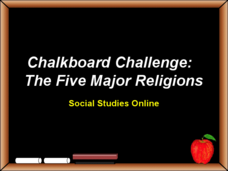Curated OER
Chalkboard Challenge: The Five Major Religions
Employing a game format, this Jeopardy-influenced game provides questions to help learners review information related to the study of world religions. The questions involve an exploration of the Hindu, Jewish, Christian, Islamic, and...
Curated OER
Tripitaka Korea
National treasures of cultural significance are always wonderful to share with learners. Expose them to the world's largest collection of woodblock text, the Tripitaka. It's a collection of 80,000 woodblocks containing the entire...
Curated OER
Perceiving a Culture Through Its Literature
Learners read After Seventeen Years by Kim Yong Ik and discuss the cultural, political and geographical aspects of Korea that specifically affect the events in the story.
Curated OER
South Korea
Students use primary and secondary resources in order to investigate the culture of South Korea. They use guiding questions that progressively lead them to higher order thinking to make connections from the information to how people live.
Curated OER
Four Folk Tales About HYO: The Confucian Tradition of Filial Piety
Students explore the nuances of Confucianism. In this Korean society lesson, students complete jigsaw reading assignments on the Hyo. Students compare their own reverence for parents to that described in the pieces about Korea.
Curated OER
PERCEIVINGT A CULTURE THROUGH ITS LITERATURE
Studentsexamine cultural values in literature, identify the cultural assumptions, prejudices, and purposes of authors and translators, use historical perspective to determine if the values and lifestyle depicted apply to contemporary...
Curated OER
COMPARING BUDDHISM AND CONFUCIANISM
Students conduct research into the two largest religions of Asia that are Buddhism and Confucianism. They set out to find the similarities and differences with the help of a graphic organizer.
Curated OER
Korean Holiday Calendar
Students engage in research in order to find the origin of a Korean holiday. They compare American holidays to the ones of Korea in order to find the true meanings of holidays in both cultures.
Women in World History Curriculum
Women and Confucianism
Young historians consider the far-reaching effects of traditional teachings on the debates about the current attitudes toward women in society. The discussion begins with a list of New-Confucian sayings and expands to a global perspective.
Curated OER
Mongol Dynasty
Young scholars identify and analyze the Yuan Dynasty; the Kings and Kingdoms; who the Mongols were and what they did; the Mongol Conquest of China; the Four Class Systems; the Genghis Kahn's rise to power; the Genghis Khan- Conquests;...
Curated OER
The Clothing of the Buddha
Students discuss the idea of cultural diffusion by examining how the sculptural portrayal of the Buddha's clothing evolved in Japanese and Chinese art. This lesson concludes with a group project and presentation.
Curated OER
The Teachings of Confucius
Sixth graders study who Confucius was and when he lived. They explain the basic ideas of Confucius, his plan for a good government, and his ideas on harmony in society. They explain the impact of Confucian teachings on contemporary...
Curated OER
Development of American Political Parties: The Two-Party System
Was American politics always bound to the two-party system? Learn how the two-party system developed, why third parties tend not to do so well, and all the various political parties that have emerged throughout US history. Each party is...
Foreign Policy Research Institute
Defining Democracy and Freedom
This is a simple but effective introduction to democracy. It requires the class to generate working definitions of key terms (provided) and to determine the degree of democracy in various geographic locations today. After they conduct...
Curated OER
China Overview: A Brief History of Chinese Dynasties
Sometimes all you need is a quick reminder and a brief outline to help put information in order. Present your class with an outline of the major accomplishments, individuals, and culture that marked each of China's ten Dynasties. This is...
Curated OER
Multiple Perspectives on the Korean War
Students interpret historical evidence presented in primary and secondary resources. In this Korean War lesson plan, students examine and analyze primary sources regarding U.S. involvement in the Korean War.
Curated OER
In My Other Life
Students explore various cultural identities. They conduct Internet research, develop a questionnaire that profiles information from their selected culture, and write a letter to a pen pal in the U.S. explaining what life in their...
Curated OER
Social Change and Modernization
In this social change and modernization worksheet, pupils respond to 6 short answer questions and answer 6 multiple choice questions regarding these sociology topics.
Curated OER
Rethinking Time, Age, And the Calendar
Students creat personal timelines, marking key events in their lives. They discuss the different events with a small group. They analyze how Western Civilization influenced their timeline in comparison to Eastern Asia.
Curated OER
Studies of the Eastern Worlds: Cultural Maps
Seventh graders look for similarities and differences in the culture of Eastern World countries by looking at the art from each country. They test their hypothesis and assumptions through further research in the media center. Finally...





















